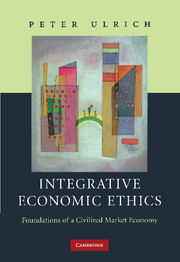Book contents
- Frontmatter
- Contents
- List of figures
- Preface
- Translator's note
- Introduction: orientation in economic-ethical thinking
- Part I Fundamental concepts of modern ethics and the approach of integrative economic ethics
- 1 The phenomenon of human morality: the normative logic of interpersonal relations
- 2 The moral point of view: philosophical developmental lines of rational ethics
- 3 Morality and economic rationality: integrative economic ethics as the rational ethics of economic activity
- Part II Reflections on the foundations of economic ethics I: a critique of economism
- Part III Reflections on the foundations of economic ethics II: rational economic activity and the lifeworld
- Part IV A topology of economic ethics: the ‘sites’ of morality in economic life
- Bibliography
- Index of subjects
- Index of names
3 - Morality and economic rationality: integrative economic ethics as the rational ethics of economic activity
Published online by Cambridge University Press: 22 September 2009
- Frontmatter
- Contents
- List of figures
- Preface
- Translator's note
- Introduction: orientation in economic-ethical thinking
- Part I Fundamental concepts of modern ethics and the approach of integrative economic ethics
- 1 The phenomenon of human morality: the normative logic of interpersonal relations
- 2 The moral point of view: philosophical developmental lines of rational ethics
- 3 Morality and economic rationality: integrative economic ethics as the rational ethics of economic activity
- Part II Reflections on the foundations of economic ethics I: a critique of economism
- Part III Reflections on the foundations of economic ethics II: rational economic activity and the lifeworld
- Part IV A topology of economic ethics: the ‘sites’ of morality in economic life
- Bibliography
- Index of subjects
- Index of names
Summary
In view of the understanding of ethics explicated above, modern economic ethics can be and has to be fundamentally developed as a rational ethics of economic activity. The basic systematic problem of modern economic ethics will be elaborated under this central idea and set off against two other approaches which have hitherto dominated the discussion.
At first sight it seems reasonable to conceive of economic ethics as ‘applied’ ethics for the areas of life and society in which the economy operates (Section 3.1). A closer look reveals, however, that such an understanding of economic ethics is inadequate. It is subject to the systematic misapprehension that ‘the economic sphere’ is an area still untouched by ethics into which morality must first be introduced and, what is more, as a complement or corrective which is external to the ‘value free’ inherent logic of the economy. This approach systematically ignores the fact that the inherent logic of the (market) economy, the extremely powerful economic rationality, itself implicitly or explicitly always claims a normative validity which inevitably comes into conflict with ethical rationality. Every conception of rationality has a normative significance, as it determines how people ought to act rationally. The position economic ethics as ‘applied’ ethics would like to fill is consequently already occupied; two competing normative logics are opposed to each other, whose relationship requires clarification.
The economic understanding of rationality is defined and cultivated paradigmatically in economic theory.
- Type
- Chapter
- Information
- Integrative Economic EthicsFoundations of a Civilized Market Economy, pp. 79 - 110Publisher: Cambridge University PressPrint publication year: 2008

